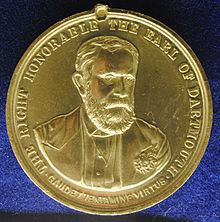William Legge, 5th Earl of Dartmouth
This article needs additional citations for verification. (June 2016) |
William Walter Legge 5th Earl of Dartmouth | |
|---|---|
 Legge on a medal whose reverse is lettered "To commemorate the opening on June 3rd 1878 of Dartmouth Park
The gift of the Earl of Dartmouth to the inhabitants of West Bromwich" | |
| Born | 12 August 1823 |
| Died | 4 August 1891 (aged 67) |
| Children | |
| Parent(s) | William Legge, 4th Earl of Dartmouth |
William Walter Legge, 5th Earl of Dartmouth (12 August 1823 – 4 August 1891), styled Viscount Lewisham until 1853, was a British peer and Conservative politician.[1]
Political career[]
Legge was elected in 1849 as Member of Parliament (MP) for South Staffordshire and held the seat until 1853, when he succeeded his father William Legge, 4th Earl of Dartmouth. He was appointed a deputy lieutenant of Staffordshire on 9 October 1852,[2] and Lord Lieutenant of Staffordshire in 1887.
Family[]
Lord Dartmouth married Lady Augusta Finch, daughter of Heneage Finch, 5th Earl of Aylesford, on 9 June 1846.[3] They had two sons, William Heneage, Viscount Lewisham (1851–1936), and the Hon. Henry Charles (1852–1924), and four daughters, who died unmarried.
Military career[]
He raised the 27th Staffordshire Rifle Volunteer Corps at Patshull on 7 March 1860 during a French invasion scare, and commanded it in the rank of captain.[4][5]
Legacy[]
hideThis article has multiple issues. Please help or discuss these issues on the talk page. (Learn how and when to remove these template messages)
|
In 1876, Lord Dartmouth leased 22.7 ha of estate land at Cooper's Hill to the West Bromwich Improvements Commissioners for the creation of Dartmouth Park. Initially the land was rented at a nominal £1 per year for 99 years. Following a design competition that attracted seven entries, the original park scheme was set out by John Maclean of Donnington, Leicestershire, and included a cricket pitch, ornamental water feature and grand carriageway. Dartmouth Park was opened to the public on 3 June 1878 at a cost of £2,500. From 1879 to 1881, West Bromwich Albion F.C. used it as an additional football ground. In 1919, the freehold to the park was awarded to the people of West Bromwich.
Notes[]
- ^ "PEER'S CURIOUS PRIVILEGE". Goulburn Evening Penny Post. New South Wales, Australia. 6 April 1912. p. 4 (EVENING). Retrieved 3 June 2018 – via National Library of Australia. ...Dartmouth's family has a curious privilege-the right to fly the Stars and Stripes. The flag often waves over beautiful Patshull, which is described so admirably by Ellen Thorneycroft Fowler in that brilliant novel, "Concerning Isabel Carnaby." The right to fly the American flag comes to the Legges because of their kinship with George Washington. Lord Dartmouth has also some noble Italian blood in his veins. His family name of Legge was once Da Lega...
- ^ "No. 21366". The London Gazette. 12 October 1852. p. 2665.
- ^ K. D. Reynolds, 'Legge , Augusta, countess of Dartmouth (1822–1900)’, Oxford Dictionary of National Biography, Oxford University Press, 2004 accessed 12 March 2017
- ^ Westlake, p. 216.
- ^ Monthly Army List.
References[]
- Burke's Peerage, Baronetage and Knightage, 100th Edn, London, 1953.
- Ray Westlake, Tracing the Rifle Volunteers, Barnsley: Pen and Sword, 2010, ISBN 978-1-84884-211-3.
External links[]
| Wikimedia Commons has media related to William Legge, 5th Earl of Dartmouth. |
- Hansard 1803–2005: contributions in Parliament by the Earl of Dartmouth
- 1823 births
- 1891 deaths
- Earls of Dartmouth
- Lord-Lieutenants of Staffordshire
- Members of the Parliament of the United Kingdom for English constituencies
- Conservative Party (UK) hereditary peers
- UK MPs 1847–1852
- UK MPs 1852–1857
- UK MPs who inherited peerages
- Conservative Party (UK) MPs for English constituencies
- Legge family
- Deputy Lieutenants of Staffordshire
- Peerage of Great Britain earl stubs
- Conservative MP for England, 1820s birth stubs